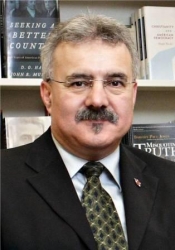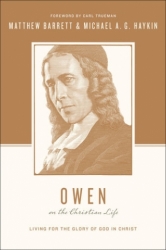Hi, I’m Fred Zaspel, editor here at Books At a Glance. Dr. Michael Haykin is talking to us again about John Calvin.
Michael, describe Calvin’s ministry in Geneva: what was it like?
Haykin:
Calvin would have seen himself primarily as a preacher; although he was obviously involved in other aspects of that ministry. There would have been counseling, there would have been elders’ meetings, issues dealing with discipline, requests for help from other nations and throughout Europe. For example, the request coming in the 1550s of sending really what amounted to missionaries to Brazil. All of these sorts of things Calvin would have had his hand in; but central to his ministry in Geneva was preaching.
Zaspel:
Were those sermons being transcribed then?
Haykin:
Yes. Calvin regularly preached without notes, extemporaneously, and very soon the elders in Geneva, in the early 1540s, recognized the importance of Calvin’s teaching and appointed a man named Denis Raguenier to transcribe them. Denis would sit there, close enough to the pulpit to hear distinctly all of Calvin’s sermon, which would normally last about 40 minutes; and with quill pen in hand, and obviously an inkpot, in which he would frequently dip his pen, he would transcribe the sermon. Initially with a shorthand, and then writing it out longhand, which he would probably have given to Calvin to approve. We have over 2000 of Denis’ copies of Calvin’s sermons this way. It’s an enormous task. And there were more; they were given away or destroyed during the 19th century, when Calvin was not in vogue in Geneva; but we are very thankful to have these 2000.
Zaspel:
Were they turned around into publication immediately then?
Haykin:
No, not necessarily; there are some that have still never been published. They are in French and some of them, therefore, would be published in French, some in English translation. I think it’s John Knox on his deathbed had a copy of Calvin’s sermons on Ephesians, at his bedside. That’s in 1572, so very quickly Calvin’s sermons are published, numbers of them anyway, are published and even translated. He ranges over all of the Scriptures; the entire New Testament he preached on, except for 2 and 3 John and Revelation, and about half of the Old Testament. As I said, he normally preached for about 40 minutes; his method was that of people like Jacques Lefevre d’Etaples, whom we spoke about earlier, or Ulrich Zwingli, where Calvin would begin at the beginning of the text and preach all the way through it. Going more slowly when he was dealing with the very dense theological works of somebody like Paul; going more rapidly when he’s dealing with narrative literature and historical accounts.
Zaspel:
What was the heart of Calvin’s ministry and its impact? Do we just say preaching here, or is there more to it?
Haykin:
Well, I think it is preaching. I think, for Calvin, Calvin could say at one point, “the Word is the instrument by which the Lord dispenses the illumination of his Spirit to believers.” And Calvin is like the other reformers – with the rediscovery of the printing press, it was now the emphasis on the Word of God, which is very much a biblical emphasis, the emphasis that our knowledge of God and our communication with God is grounded and rooted in the Scriptures in which God has revealed himself, and not only revealed himself, but spoken.
Medieval Catholicism had majored on symbols and images as the central means of teaching. The Reformation, coming as it did hard on the heels of the invention of the printing press in the 15th century, turned back to the biblical emphasis on words – spoken, written – as a primary vehicle for cultivating faith and spirituality. As for Calvin, if there was no preaching, there was no church. Calvin could then say that “whenever we see the Word of God purely preached and heard, and the sacraments administered according to Christ’s institution, it is not to be doubted a church of God exists.” For Calvin, the heart of his ministry was preaching; and this was vital because preaching was a mark of a true church.
Zaspel:
We’re talking to Dr. Michael Haykin, Professor of Church History at The Southern Baptist Theological Seminary and author of many books related to church history that you can check out here on our page. Next time Dr. Haykin will talk to us about John Calvin and Reformation Missions.
Editor’s Note: You’ll want to check out these church history related titles from Dr. Haykin.
Books by Michael Haykin
The Advent of Evangelicalism: Exploring Historical Continuities
Amazon (Paperback)
To the Ends of the Earth: Calvin’s Missional Vision and Legacy
The Revived Puritan: The Spirituality of George Whitefield (Classics of Reformed Spirituality)
Amazon (Paperback)
The Baptist Story: From English Sect to Global Movement
The Christian Lover: The Sweetness of Love and Marriage in the Letters of Believers
Pentecostal Outpourings: Revival and the Reformed Tradition
The Reformers and Puritans as Spiritual Mentors: Hope Is Kindled (Christian Mentor)
Patrick of Ireland: His Life and Impact (Biography)
Rediscovering the Church Fathers: Who They Were and How They Shaped the Church
Eight Women of Faith
Amazon (Paperback) (Kindle) (Audiobook) (Audio CD)
Soldiers of Christ
Amazon (Paperback)
Jonathan Edwards: The Holy Spirit in Revival (Emmaus)
Amazon (Paperback)
Defence of the Truth: Contending for the Faith Yesterday and Today
Amazon (Paperback)
Ardent Love for Jesus: English Baptists and the Experience of Revival in the Long Eighteenth Century
Amazon (Paperback)
Kiffin Knollys & Keach: Rediscovering English Baptist Heritage
Amazon (Paperback)
A Cloud of Witnesses: Calvinistic Baptists in the 18th Century
Amazon (Paperback)
Bitesize Biographies: George Whitefield
Amazon (Paperback)
Devoted to the Service of the Temple: Piety, Persecution, and Ministry in the Writings of Hercules Collins (Profiles in Reformed Spirituality)
Travel with Jonathan Edwards
Amazon (Paperback)
Joy Unspeakable and Full of Glory: The Piety of Samuel and Sarah Pearce (Classics of Reformed Spirituality)
Amazon (Paperback)
A Consuming Fire: The Piety of Alexander Whyte
Baptists and War: Essays on Baptists and Military Conflict, 1640s-1990s
Amazon (Paperback) (Hardcover) (Kindle)
A Heart for Missions: Memoir of Samuel Pearce
Amazon (Paperback)
A Sweet Flame: Piety in the Letters of Jonathan Edwards (Profiles in Reformed Spirituality)
Waiting on the Spirit of Promise: The Life and Theology of Suffering of Abraham Cheare (Monographs in Baptist History)
Amazon (Paperback) (Hardcover) (Kindle)
Christ Is All: The Piety of Horatius Bonar (Profiles in Reformed Spirituality)
The Armies of the Lamb: The Spirituality of Andrew Fuller (Classics of Reformed Spirituality)
Amazon (Paperback)
To Honour God: The Spirituality of Oliver Cromwell (Classics of Reformed Spirituality)
Amazon (Paperback)
An Orthodox Catechism
The Empire of the Holy Spirit
Amazon (Kindle)
“The First Counsellor of our Denomination”: Studies in the Life and Ministry of Abraham Booth
Amazon (Kindle)
Church History 101: The Highlights of Twenty Centuries
Amazon (Paperback) (Kindle) (Audiobook) (Audio CD)
Owen on the Christian Life: Living for the Glory of God in Christ
The British Particular Baptists, Vol. 1: 1638 – 1910
Amazon (Hardcover)
The British Particular Baptists Vol. II: 1638-1910
Amazon (Hardcover)

